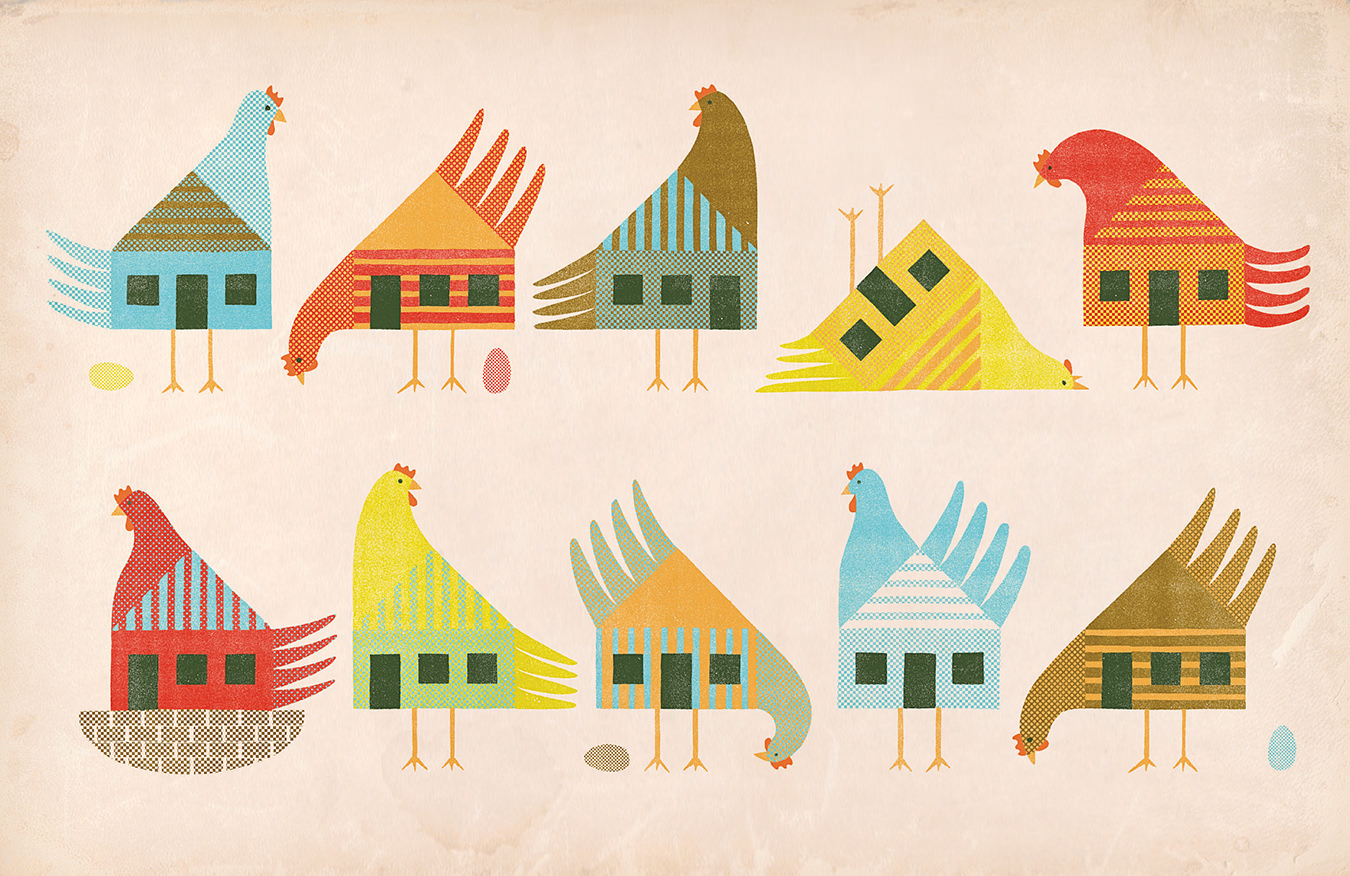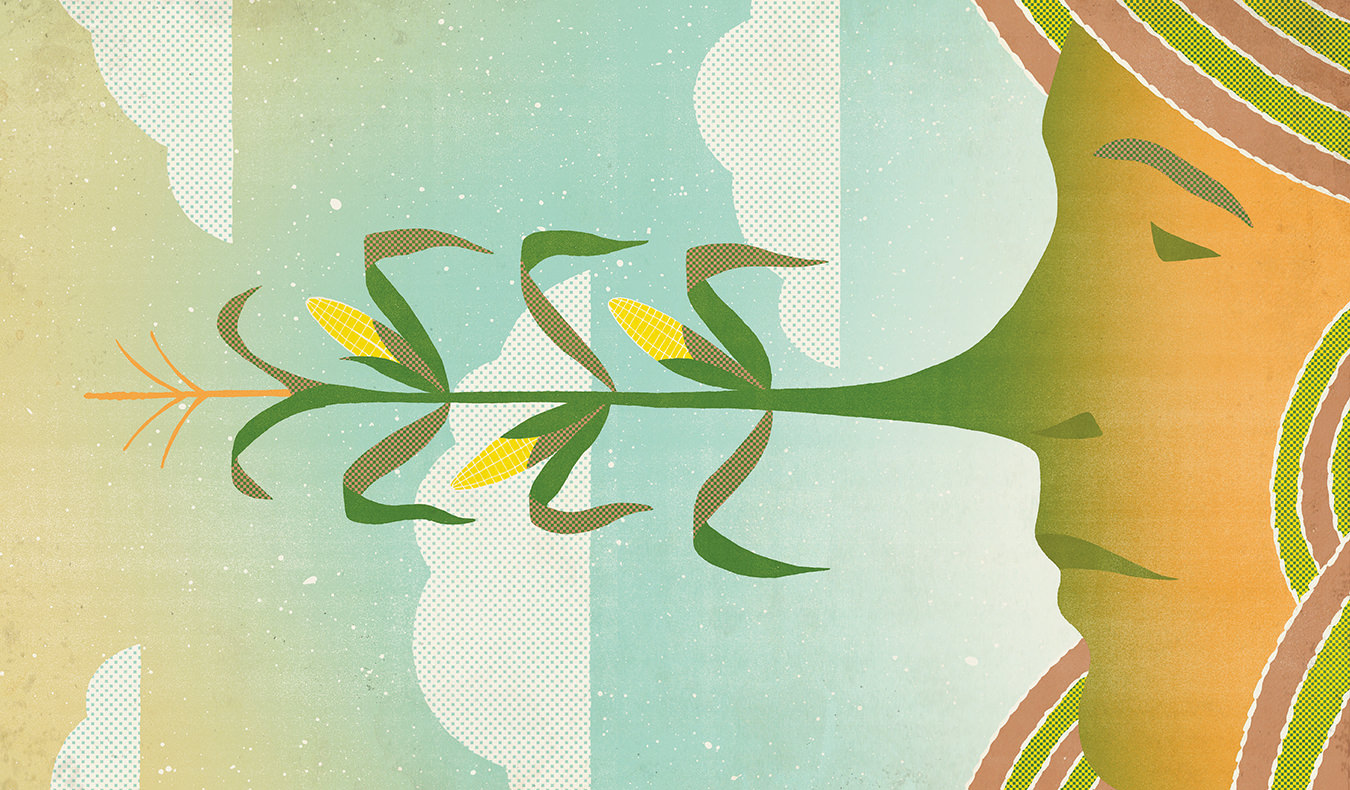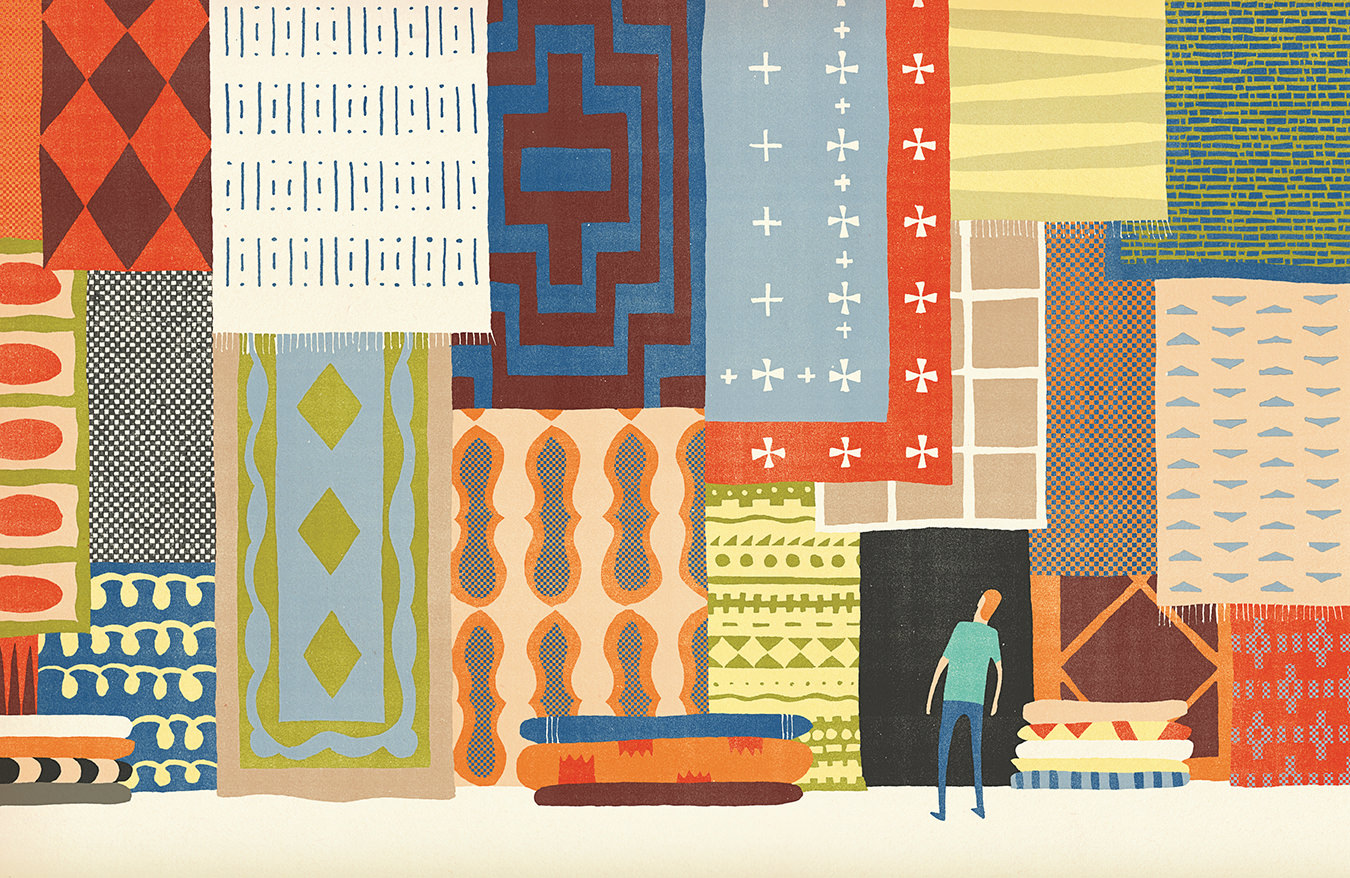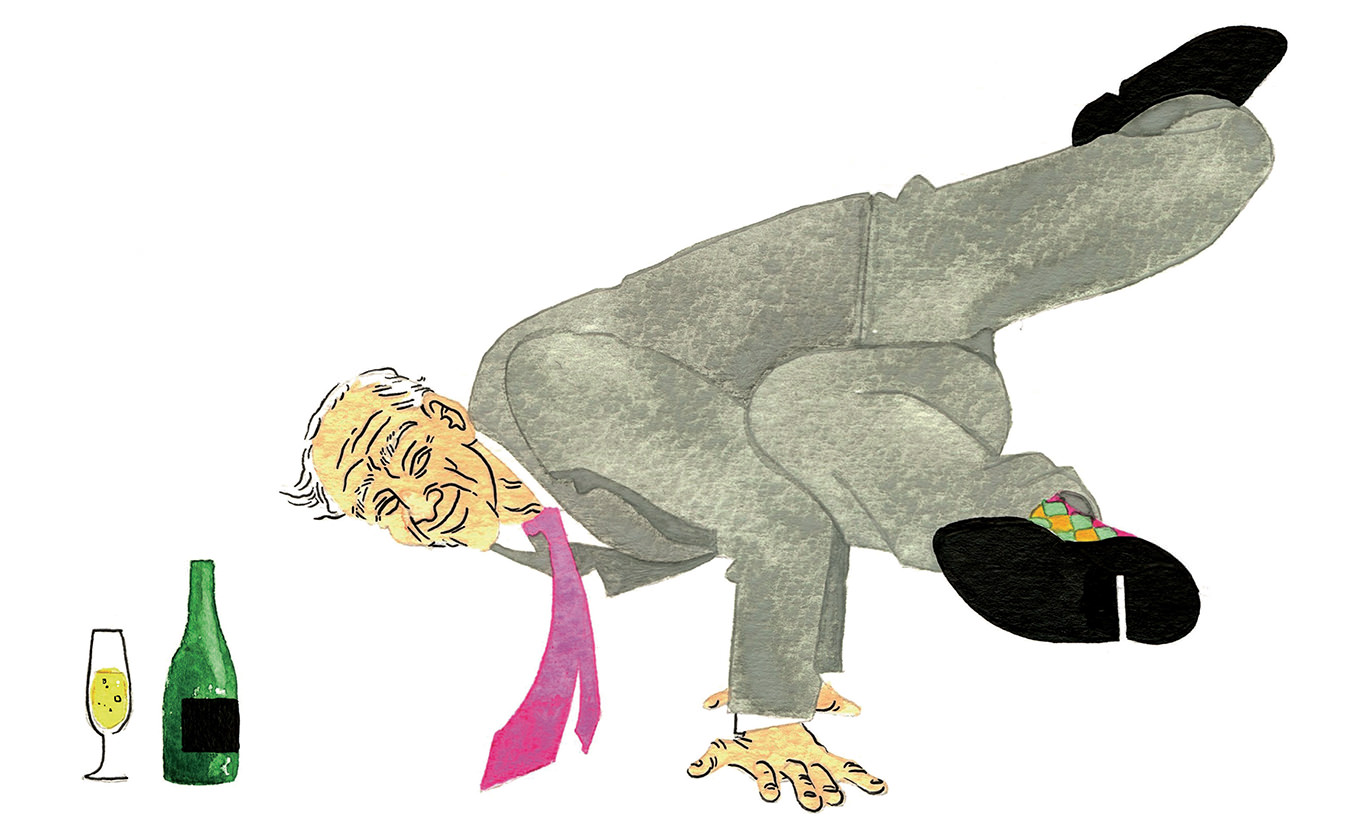A Mess of Change
That leftover foreign currency.
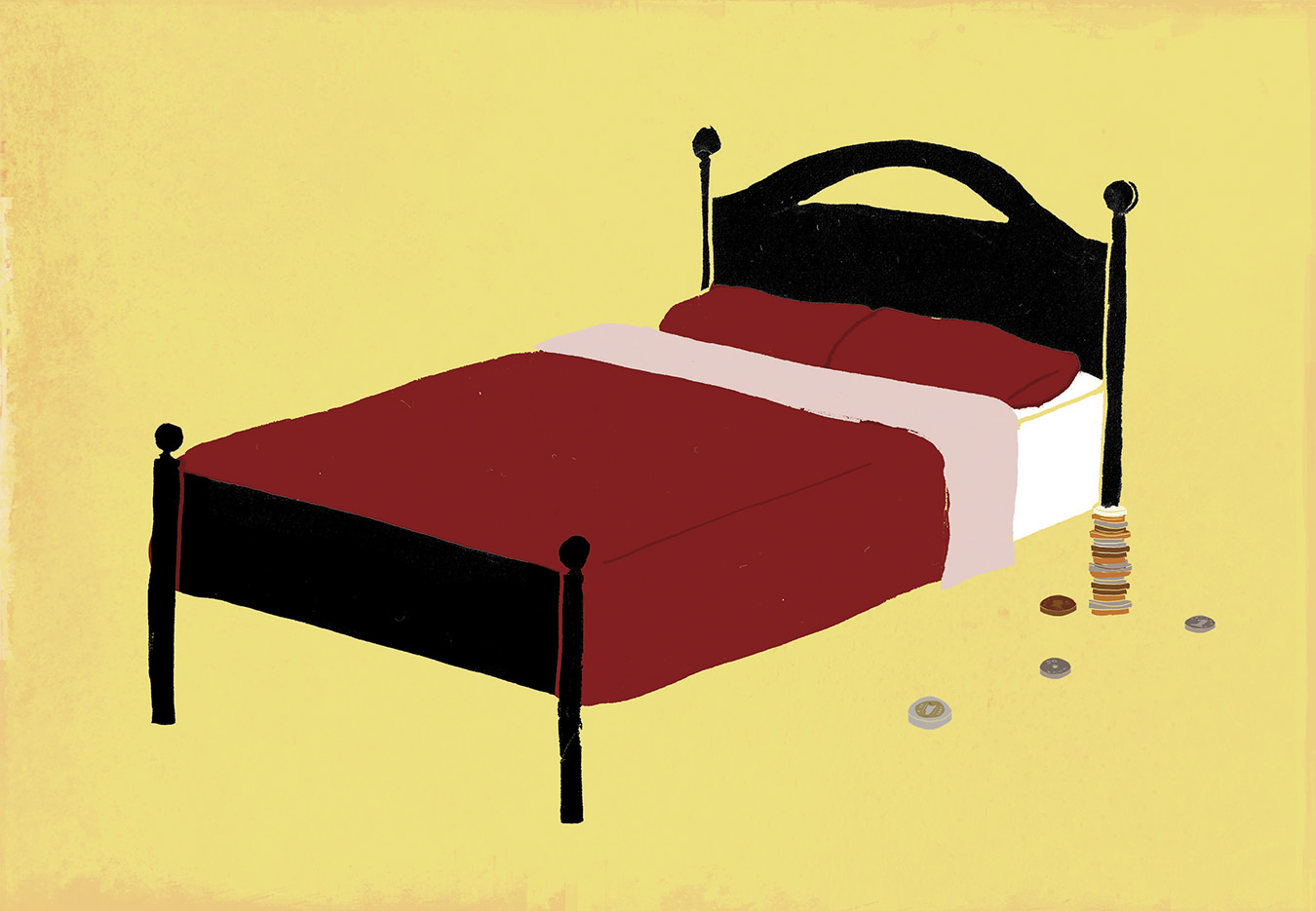
Illustration by David Senior.
My family has more money than we know what to do with. Unfortunately, it’s not in a safe, a money market account, or a promising hedge fund. It’s been sitting, for many years, in a heavy cardboard box under my parents’ bed.
They’re not pioneering a novel investment strategy designed to ride out the global downturn. Although the weight of the box—my inheritance—grows at a rate that would make many investors envious, its contents are mostly useless. The under-the-bed fund is in pesos, won, francs, and dirhams, among other currencies, but contains no single one in great enough quantity to get a forex trader excited. It’s in currencies that have been devalued since anyone in our family last visited the country in question, like Turkish liras, or abolished entirely, like Spanish pesetas and others that gave way to the euro. It’s in currencies belonging to places that we just don’t know when we’ll get back to.
Out of curiosity and a vague sense that maybe we could do something useful or remunerative with it, my mother tallied everything in the box. She counted bills and coins from 34 countries in total, including Fiji, Morocco, and Brunei. Strangely, there was no currency from Australia, where I spent six months and my parents spent four, but there was a small pile of coins from Guatemala, which left us asking one another, “Who went there?” (No one, apparently.)
I teased my mother for accumulating this dusty pile. But when I got back to my apartment, I observed that I, too, had a bookshelf corner becoming increasingly devoted to little glass jars and Ziploc bags full of coins and bills. A few were labelled and contained money I had thought would be useful, like British pounds. Others were higgledy-piggledy. A film canister contained a small stack of Chinese coins.
I’d hauled this stash around with me from apartment to apartment. I couldn’t bring myself to throw away money because, well, it’s money. Preventing me from just tossing the money in the trash was the same sort of illogical yet compelling moral reasoning we use when we tell kids to eat their peas because children are starving in Africa, even though pea-eating in one place doesn’t make any peas turn up in the other. It would be useful to someone, somewhere, if only it were there and not here.
And yet it was surprisingly hard to find useful things to do with it. Even if you could find a money changer who would pay you dollars for 30 lempiras—which you can’t—the return on the time involved in getting across town probably wouldn’t be worth it. My mother suggested we find a kid who collected coins to take the trove off our hands. But a quick survey revealed that the few 11-year-olds I knew preferred to collect things like rubber bracelets and virtual badges. Being in my position—an anti-clutter person stuck with little jars of unwanted souvenir metal—I couldn’t blame them for making virtual goods their prized possessions.
I briefly thought about making an art project out of it all. I could frame the bills and glue the coins into a collage. But if I were the kind of person who made art out of found objects, I probably wouldn’t mind coin clutter so much.
“What about the collectors’ market?” my mother asked. But self-respecting numismatists, it turns out, prefer rarer bills in better condition than most of what we have. Mass-circulation currency from recent years isn’t usually worth more to any collector than its face value, and sometimes it’s worth less. One notable exception is the Zimbabwean $100-trillion bill circulated for just a few months before the inflation-plagued African nation abandoned it in 2009. At the time it could barely buy you lunch in Harare. Now, though, the bills have become fashionable collector’s items among investors and economists, who buy them just for the fun of having $100-trillion or to wave around as cautionary tales of monetary policy gone wrong. (Are you listening, Greece?) A pristine $100-trillion note can go for as much as $10 on eBay.
Every traveller has grappled with the loose-change predicament. Even in this electrified age, you need a little pool of cash while you’re travelling.
Every traveller has grappled with the loose-change predicament. Even in this electrified age, you need a little pool of cash while you’re travelling. It’s de rigueur for taxis and tips—are you really going to offer the bellboy your credit card?—even if you don’t go in for street food, as I do. I’ve yet to find the noodle cart that takes AmEx.
If I can’t sell the growing piles away, I thought, I can at least try to keep them in check. So, shortly after discovering my own international monetary fund, I made it a goal to end every foray abroad with zero local dough. The challenge begins on the last day or two of my trip. If I overestimate what I need for those final train fares and snacks, I take off with soon-to-be-useless coins in my pocket. If I underestimate, the risks may be greater.
I should note here an experience I had at the impressionable age of 20, which may account for my fixation on this subject two decades later. Dusty and creased after a month on the road, a friend and I were about to catch a plane from Amman to Cairo, where we were studying and had an apartment. We had a few dinars left, and marshalled them carefully. We calculated how much it would cost for our last night in a hostel, how much for our last bowl of hummus and ful, and how much to get a taxi to the airport. Foolproof, we thought. We were masters of precision. At the airport, though, we learned of the departure tax, a nasty little revenue strategy employed by many countries to siphon more from unwitting travellers, more painful, somehow, than a visa fee or airfare tax because it comes like a punch in the head on your way out the door.
We didn’t have the money. Not in dinars, Egyptian pounds, or U.S. dollars. I didn’t even have any traveller’s cheques left. (Remember traveller’s cheques?) My friend had a credit card, but the customs officials wouldn’t accept it, nor was there an open bank at the airport. Our only option would have been to miss our flight and go back to the city to find a bank, which was impossible because we didn’t have any cash to pay the taxi fare. Without other options, we pleaded with the customs officers to let us through, growing increasingly panicked as our departure time approached, after which we would be stuck in Jordan not only dinar-less but also in need of another plane ticket. I began to feel a sense of emergency, imagining what would happen next. Should we storm the security gates and run for our plane? Would a diplomatic incident result? Would we fester in jail while our families wondered where we were?
By sheer coincidence, a calm, dapper, middle-aged foreigner appeared at the security gates, where we were now engaged in tearful, bedraggled debate with the officials, and noticed us on the way to his plane. He turned out to be a Canadian diplomat. He took pity and paid our departure tax, for which I promised to mail him a cheque. I never did. But if you’re out there, sir, let me know and I’ll send you that $11.
Granted, as the world has digitized and I’ve moved beyond my backpacker/student years, the risks incurred when I underestimate my end-of-trip cash needs have changed to seem less existential. Nevertheless, I play the game to win.
Sometimes UNICEF comes to the rescue. UNICEF works with nine airlines to funnel spare currency to charity projects in its Change for Good program. If you’re on, say, a Cathay Pacific flight, the flight attendants bring around little envelopes for you to donate whatever leftovers you have in your billfold. Unlike your local bank, UNICEF takes any currency you’ve got. Since 1987, it’s raised over $70-million (U.S.) this way. Meanwhile, some airports allow a local charity to set up a collection box in the departure lounge. But globally, this isn’t the norm.
And so I play the game. On a recent assignment to Mexico, I thought I was on target. My cash dwindled in tandem with the number of hours I had left in-country. But I hadn’t counted on my employer putting me up in an all-inclusive resort on the last night. Suddenly the pesos I had saved for fish tacos were superfluous. I spent down my stash on a Cancun airport hamburger—not a great value for the money in objective terms, but I place great value on achieving my goal. The result: I walked out of Mexico with 38 pesos, or $2.79. Not bad. But not ideal. That’s $2.79 that’s doing nothing until the next time I’m there.
I’m in Paris as I write this, thanking the powers that be for the euro, which, for the moment, prevails in 17 nations. It may have put my lire out of business, but I’ll trade that for the convenience of travelling from Helsinki to Jerez de la Frontera without having to cash in currency at every border, and finding myself back home with eight schillings and 13 escudos despite my best efforts.
And yet the euro doesn’t always seem all that stalwart. It’s not just the threat that individual countries might pull out if they can’t come to terms with their euro-mates on the matter of sovereign debt. Last night, I looked at my bistro bill, and noticed that right under the total of €57.57, it listed the price as 377.63 francs. Francs haven’t been legal tender since 2002. Perhaps Au Bon Coin is catering to an aging crowd. Or perhaps it’s hedging its bets.
If the euro is going down the tubes, that’s all the more reason to dump my stash quick. I’m making my calculations. I know exactly how many croissants I’m going to consume between now and my flight, exactly how much my metro ticket will cost. I’ll do whatever it takes to get out of here with zero currency. Heck, I’ll even buy a souvenir Eiffel Tower—something I wouldn’t mind throwing out.

